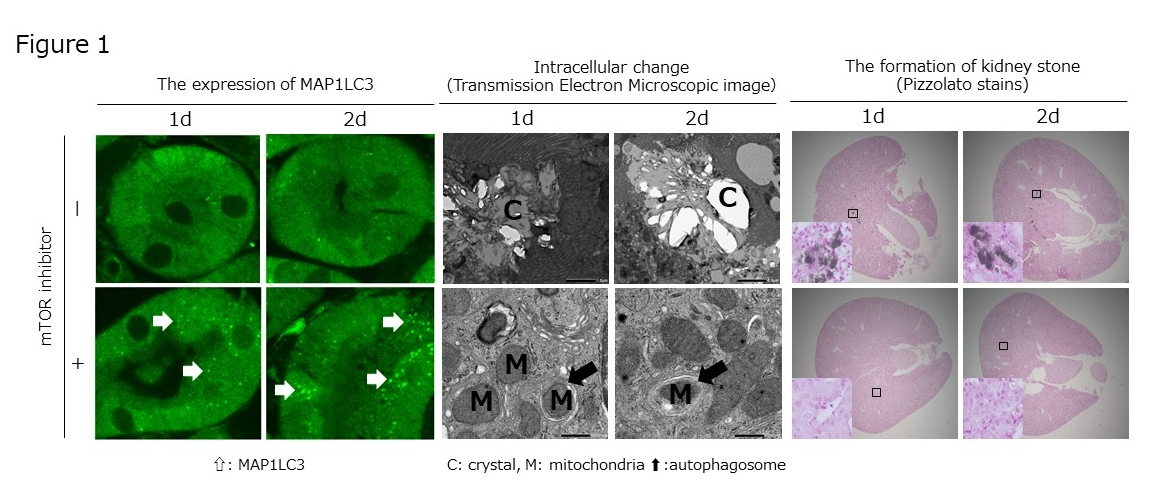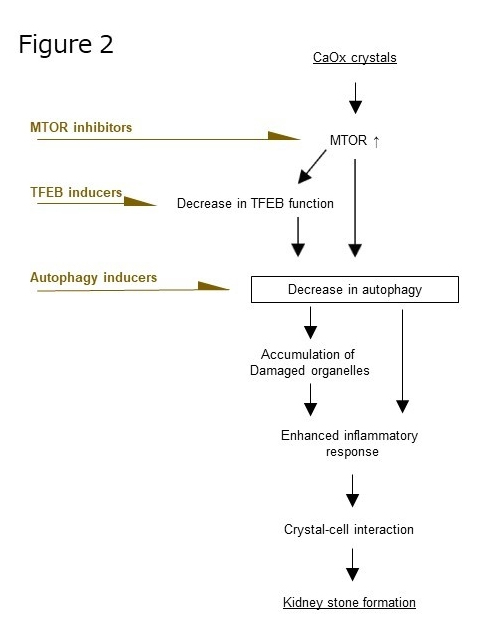Deregulated mTOR is responsible for autophagy defects exacerbating kidney stone formation
August 7,2019
Dr. Takahiro Yasui (Professor, Nagoya City University) and Dr. Rei Unno (Research fellow, Nagoya City University) in collaboration with Dr. Tsuyoshi Kawabata (Associate Professor, Nagasaki University) have revealed a novel mechanism for kidney stone formation, using the mouse cultured cell, mouse model for kidney stone, and human kidney tissue. They found that autophagic activity was significantly decreased in mouse renal tubular cells (RTCs) exposed to calcium oxalate (CaOx) monohydrate crystals and in the kidneys of GFP-conjugated MAP1LC3B (microtubule- associated protein 1 light chain 3 beta) transgenic mice with CaOx nephrocalcinosis induced by glyoxylate (GOX).This caused accumulation of damaged intracellular organelles, such as mitochondria and lysosomes, the normal functioning of which is mediated by functional autophagy. An impairment of autophagy was also observed in the mucosa with plaques of CaOx kidney stone formers. Moreover, they determined that the decrease in autophagy was caused by an upregulation of mTOR, which consequently resulted in the suppression of the upstream autophagy regulator TFEB (transcription factor EB). Furthermore, they showed that an mTOR inhibitor could recover a decrease in autophagy and alleviate crystal-cell interactions and the formation of crystals associated with increased inflammatory responses (Figure 1). As chemical inhibition of mTOR ameliorates kidney stone development, this result proposed that deregulated mTOR and resultant impairment in autophagy is a key target for prevention or treatment of the disease (Figure 2).
Dr. Takahiro Yasui (Professor, Nagoya City University) and Dr. Rei Unno (Research fellow, Nagoya City University) in collaboration with Dr. Tsuyoshi Kawabata (Associate Professor, Nagasaki University) have revealed a novel mechanism for kidney stone formation, using the mouse cultured cell, mouse model for kidney stone, and human kidney tissue. They found that autophagic activity was significantly decreased in mouse renal tubular cells (RTCs) exposed to calcium oxalate (CaOx) monohydrate crystals and in the kidneys of GFP-conjugated MAP1LC3B (microtubule- associated protein 1 light chain 3 beta) transgenic mice with CaOx nephrocalcinosis induced by glyoxylate (GOX).This caused accumulation of damaged intracellular organelles, such as mitochondria and lysosomes, the normal functioning of which is mediated by functional autophagy. An impairment of autophagy was also observed in the mucosa with plaques of CaOx kidney stone formers. Moreover, they determined that the decrease in autophagy was caused by an upregulation of mTOR, which consequently resulted in the suppression of the upstream autophagy regulator TFEB (transcription factor EB). Furthermore, they showed that an mTOR inhibitor could recover a decrease in autophagy and alleviate crystal-cell interactions and the formation of crystals associated with increased inflammatory responses (Figure 1). As chemical inhibition of mTOR ameliorates kidney stone development, this result proposed that deregulated mTOR and resultant impairment in autophagy is a key target for prevention or treatment of the disease (Figure 2).


| Title | Deregulated mTOR is responsible for autophagy defects exacerbating kidney stone formation |
| Author | Rei Unno,Tsuyoshi Kawabata,Kazumi Taguchi,Teruaki Sugino,Shuzo Hmamoto,Ryosuke Ando,Atsushi Okada,Kenjiro Kori,Tomotsu Yoshimori&Takahiro Yasui |
| Article URL | |
| Researcher URL |


